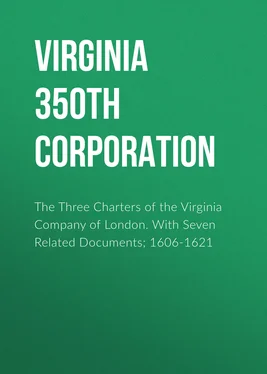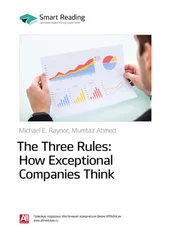Virginia 350th Anniversary Celebration Corporation - The Three Charters of the Virginia Company of London. With Seven Related Documents; 1606-1621
Здесь есть возможность читать онлайн «Virginia 350th Anniversary Celebration Corporation - The Three Charters of the Virginia Company of London. With Seven Related Documents; 1606-1621» — ознакомительный отрывок электронной книги совершенно бесплатно, а после прочтения отрывка купить полную версию. В некоторых случаях можно слушать аудио, скачать через торрент в формате fb2 и присутствует краткое содержание. Жанр: foreign_prose, История, foreign_edu, foreign_antique, на английском языке. Описание произведения, (предисловие) а так же отзывы посетителей доступны на портале библиотеки ЛибКат.
- Название:The Three Charters of the Virginia Company of London. With Seven Related Documents; 1606-1621
- Автор:
- Жанр:
- Год:неизвестен
- ISBN:нет данных
- Рейтинг книги:5 / 5. Голосов: 1
-
Избранное:Добавить в избранное
- Отзывы:
-
Ваша оценка:
- 100
- 1
- 2
- 3
- 4
- 5
The Three Charters of the Virginia Company of London. With Seven Related Documents; 1606-1621: краткое содержание, описание и аннотация
Предлагаем к чтению аннотацию, описание, краткое содержание или предисловие (зависит от того, что написал сам автор книги «The Three Charters of the Virginia Company of London. With Seven Related Documents; 1606-1621»). Если вы не нашли необходимую информацию о книге — напишите в комментариях, мы постараемся отыскать её.
The Three Charters of the Virginia Company of London. With Seven Related Documents; 1606-1621 — читать онлайн ознакомительный отрывок
Ниже представлен текст книги, разбитый по страницам. Система сохранения места последней прочитанной страницы, позволяет с удобством читать онлайн бесплатно книгу «The Three Charters of the Virginia Company of London. With Seven Related Documents; 1606-1621», без необходимости каждый раз заново искать на чём Вы остановились. Поставьте закладку, и сможете в любой момент перейти на страницу, на которой закончили чтение.
Интервал:
Закладка:
Virginia 350th Anniversary Celebration Corporation
The Three Charters of the Virginia Company of London / With Seven Related Documents; 1606-1621
INTRODUCTION
Historians may trace in the Royal charters issued to the Virginia Company of London a course of empire; a Company organized for profit by the ablest businessmen of their time—merchants, manufacturers, statesmen, and artists who bound themselves together in a joint stock enterprise. The historian may also find in the three charters here published a pattern for a parliamentary system and its development into the American form of government. He might even perceive the inception of a new society.
The origin of the joint stock company was probably primitive. Its later genesis may readily be seen in the medieval guild. It became an English institution in its application by Sir Walter Raleigh to his magnificent adventures in both honest trade and romantic piracy.
The Company provided an agency for assembling adventure capital and supplying able management to enterprises of great moment. It offered an invitation to the industrious to participate in the growing wealth and expanding power of the great English middle class. It supplied an opportunity to small investors and it limited their liability. It was an adaptation by practical people to practical problems.
Subscribers, or shareholders, met in their quarterly courts to discuss the business of the Company and participate in its management. These courts were the counterpart of our present day corporate stockholders' meetings and were characterized by the same sort of discussions. King James could protest vehemently against the "democratical principles of the Company." He could see in their charters the final death warrant of feudalism. He could execute Raleigh "chiefly for giving satisfaction to the King of Spain." He could revoke the charters in 1624, but he could not stop the rising tide of representative institutions nor darken the great vision of the liberal Elizabethans. A new day had dawned.
The General Assembly which met at Jamestown in 1619 was the natural child of the Company. Some of the planters along the James River were shareholders in the Company. They had a voice in its management. In the management of the civil affairs of the Colony it was, therefore, logical that the plantations should elect their representatives to the local governing body. It was thus that the first freely elected parliament of a self-governing people in the Western World came into existence. Its principles were based on those of the corporation chartered and organized for profit by businessmen.
The three charters here published, changed successively to meet changing conditions, were the rules and the by-laws for the commercial, economic, and political development of a homogeneous, industrious English society in a land of opportunity. The principal authors and executors of the charters, Sir Thomas Smith and Sir Edwin and George Sandys, were businessmen. They were practical men. They found a practical way to assemble capital and ability, and coordinate them in constructive enterprise.
A hundred years before the great Virginia adventure, Luther, Erasmus, and Columbus rang down the curtain on the weary and confined drama of the Middle Ages. Expanding horizons challenged man's vision and intellect. Great courage made Englishmen adventurers in all things.
The charters here presented are among the world's great documents. The first which was drawn while Sir Edward Coke was Lord Chief Justice is replete with certain traditional and feudal principles, reverence for the English common law and the supreme authority of the King and his agents. The second, principally the work of the liberal Sir Edwin Sandys with the approving participation of Sir Francis Bacon, great exponent of natural law, marks a transition from government by arbitrary royal authority to the concept that government rests on the consent of the governed and on the fundamental right of man to enjoy the fruits of his labor. Students may read in this charter the first principles of the American Constitution. The third charter is an attempt to refine principles enunciated in the second in the light of experience. In addition to its political significance, the second charter proved a tremendous stimulus to the Virginia enterprise.
Gondomar, the Spanish Ambassador, wrote to his King that "fourteen Counts and Barons have given 40,000 ducats, the merchants give much more and there is no poor little man or woman who is not willing to subscribe something." The landed aristocracy, gentry, merchants, and yeomen had joined in a company which they directed to provide capital and ability for a great enterprise.
The text of the three charters of the Virginia Company is taken from a contemporary copy recently discovered among the Chancery Rolls of the Public Record Office in London—contemporary enrollments "representing the official text of the charters kept in official custody," according to the Deputy Keeper, Mr. D. L. Evans. A photostatic copy of this manuscript is in possession of the Virginia State Library. Each charter was transcribed in England by Doctor Nellie J. M. Kerling for the editor's use.
Heretofore scholars have had access to the charters only through the text in William Stith's The History of the First Discovery and Settlement of Virginia (Williamsburg, Printed by William Parks, 1747), in sources based upon this, or in Alexander Brown's The Genesis of the United States (Boston, 1890).
No original of any of the charters is known to exist, although other copies of varying degrees of completeness have been located in England and on the continent. One copy, made with the authority of the Governor, Council, and House of Burgesses of the Colony, was used as evidence to support a petition against Lord Culpeper's land grants. This is included in the Henry Coventry papers in the library of the Marquess of Bath at Longleat, Wiltshire, England (Vol. LXXVI, Papers relating to Virginia, Barbados, and other Colonies, 1606-1675 ). These documents have been microfilmed by the American Council of Learned Societies, "British Manuscripts Project." Many of them will soon be published by the Virginia Historical Society under the editorship of Dr. W. E. Washburn.
Another copy of the charters is in the Public Record Office, "Entry books of letters, commissions, instructions, charters, warrants, patents, grants, etc." (formerly "Record book No. LXXIX"), an abstract of which appears in the Calendar of State Papers, Colonial Series , Vol. I. Microfilm copies of this text are in the Library of Congress and the Virginia State Library. Other copies have recently been discovered in France and Spain by Dr. George Reese who has been employed by the Virginia 350th Anniversary Celebration Corporation to search foreign libraries for documentary material pertinent to the study of 17th century Virginia. Ultimately, microfilm copies of these records will be made available to research libraries in the United States.
The seven accompanying documents, included to illustrate the practical rather than theoretical basis of the administration of the Colony, have been taken from the best available manuscript or printed source. These official papers, together with the three charters of the Virginia Company, may be termed the constitutions and are the basic sources for the study of the Colony during the first fifteen years of its existence.
A few necessary liberties have been taken in transcribing these documents: abbreviations and contractions have been spelled out, capitalization and punctuation have been adjusted according to modern usage and, to prevent possible confusion, certain letters used interchangeably (such as "i" and "j", "v" and "u") are employed according to twentieth century practice. In the text of the three charters, omitted words or phrases have been supplied in brackets from the text in Stith. Brackets are also employed to supply the name of an adventurer if there is any deviation in spelling between Stith and the manuscript version: e.g. , "Sir Charles Willmott, Knight [Wilmot]."
Читать дальшеИнтервал:
Закладка:
Похожие книги на «The Three Charters of the Virginia Company of London. With Seven Related Documents; 1606-1621»
Представляем Вашему вниманию похожие книги на «The Three Charters of the Virginia Company of London. With Seven Related Documents; 1606-1621» списком для выбора. Мы отобрали схожую по названию и смыслу литературу в надежде предоставить читателям больше вариантов отыскать новые, интересные, ещё непрочитанные произведения.
Обсуждение, отзывы о книге «The Three Charters of the Virginia Company of London. With Seven Related Documents; 1606-1621» и просто собственные мнения читателей. Оставьте ваши комментарии, напишите, что Вы думаете о произведении, его смысле или главных героях. Укажите что конкретно понравилось, а что нет, и почему Вы так считаете.












